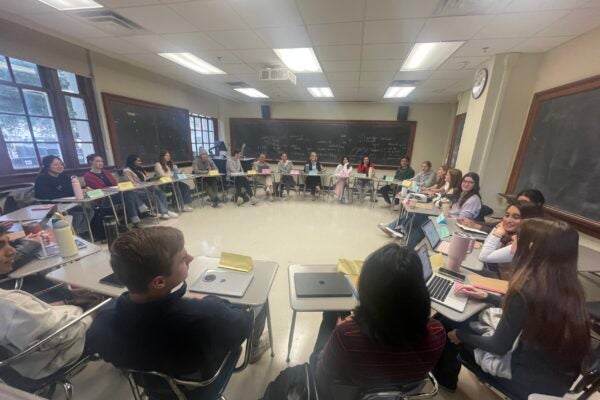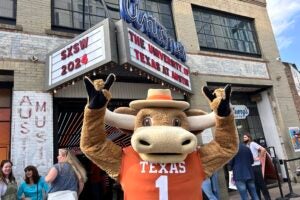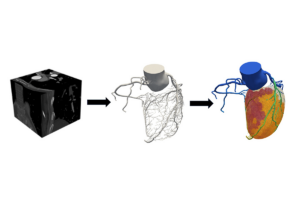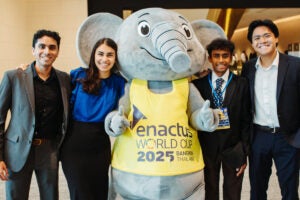It started with pain, an unfamiliar pain in one of her breasts. “I tell my students pain is a blessing. Most people try to avoid pain, but pain is a blessing.”
Despite having a clean mammogram six months earlier, Steph Osbakken went in for another and learned she had stage 2 breast cancer. She was 43, the mother of two daughters, 5 and 4, and a popular lecturer in UT’s Sociology Department. In the nine years since that day, Osbakken leveraged her experience as a patient and a survivor for a course she calls simply Cancerland. She describes the class, taught each spring, as “thinking about the social and cultural experiences of cancer.”
After her diagnosis came a deluge of appointments — for an ultrasound, a mammogram, an MRI and a biopsy that confirmed the cancer. “You’re just into this dystopic reality when you’re first diagnosed,” she recalls. Because she was young and could tell it was very aggressive, they thought it might be genetic, which was quickly confirmed with a test.

Next, she had to interview and pick teams of doctors, radiation oncologists, medical oncologists, surgical oncologists — interviewing two to four teams in each category.
UT allowed her to take medical leave for Spring 2017, when she started chemotherapy. “I had such grace from colleagues and supervisors — I can’t even express my gratitude.” She burned through sick leave, medical leave and sick leave pool, in which other UT employees can donate their sick leave hours.
She received her last chemo treatment August 8 of that year, and started teaching her fall classes but left again in September for a bilateral mastectomy. Many colleagues pitched in to cover her classes. “I have colleagues all over this University who came in to give guest lectures to help me out. It was a really magical show of community.”
Four weeks later, Osbakken returned to the classroom, remarkably soon for having had a 12-hour surgery. “It was really important for me to come back, and that’s what was keeping me alive, frankly — the whole idea of getting back to my life, getting back to my students. Being in my role here was psychologically such an essential piece.” Now, she is an associate professor, Associate Director of Academic Affairs for the Health and Society Program and an Associate Director of the Plan II Honors program.
***
Before cancer entered her life, Osbakken had taught about the sociology of education, sociology of the family and a course on sociological methods. Additionally, for years, she had been interested in subjects such as spirituality and health and Eastern traditions of wellness and balance. As far back as graduate school, she loved applying sociological understanding and practice to health.
Osbakken was teaching in the Health and Society Program, a major that looks at how social factors explain health outcomes and that cuts across disciplines and includes large numbers of sociology students as well as natural sciences students who may be on a path to medical school. She led courses that bookend the major, teaching both a 300-student introduction course and a capstone course for health and society majors.
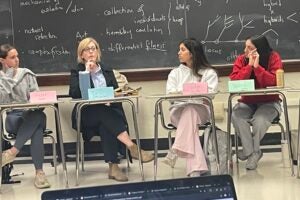
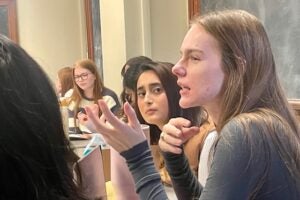
Then it all came home. Virtually from the moment she was diagnosed, she knew she would create a course. “I have to have a class about cancer,” she recalls thinking, “because I immediately saw things from a perspective I had only ever read about before. I had the lived experience of being a patient, really, for the first time ever. Now I’m in the system; I am this person. Where do I have autonomy? Where am I subjected to the rules of that system? In sociology, it’s classic structure and agency.” The structures are institutions, families, all the things outside of us; our agency is how much we get to choose.
As Osbakken walked through this new world, she could tell she was better equipped than many because of her education, confidence and ability to research on her own. “I was going into all of these spaces — medical appointments, the infusion room to have chemotherapy.” Developing a course was also where her active mind naturally went. “You’re sick, but you’re also bored, sitting at home,” she remembers.
“I started to accumulate all of these amazing professional and personal contacts. I was like, I’ve got to bring these to my students. This can’t just shape me; I’ve got to use this experience to help shine this particular light on this arena for my students. I know so many of my students are med school-bound or health professions-bound or want to go into health more broadly and to be an agent for change.” In fact nearly half of her students are pre-med, and several others are pre-health-professions.
One of those is Riley Chaudhuri, a senior majoring in health and society on the pre-med track. This is her third class with “Dr. O,” as Osbakken is known. That Chaudhuri did not need the class for her degree and signed up for a course called Cancerland “for fun” speaks to students’ affection for Osbakken.
She calls her professor fun and exciting. “She really wants you to succeed. She’s open, and she wants you to critically analyze the articles and think about cancer from a different perspective. I want to go into health care and learn the science aspect of all of it, but being in her class teaches me the other aspects of it, like how the environment affects your health and other things I don’t think I would ever learn in med school.”
This can't just shape me; I've got to use this experience to help shine this particular light on this arena for my students."
The discussion-based nature of the class was the biggest draw. “Everyone who gets into UT — they’re amazing and fascinating,” Chaudhuri says, “and they have all these ideas that I’ve never thought about before.”
* * *
When the course began in 2017, there was one student who was a “disruptive and contrarian force in the classroom,” Osbakken remembers, and who “killed the vibe.”
“So I said, people who want to be at this table need to also think about what they are bringing to this discussion. Are they going to be a responsible and respectful member of our community? I wanted to build a space where students can be vulnerable. I had students in that first class who had their own lived experience with cancer — one slightly older, who had had breast cancer, and one who had lost her mother in high school to cancer, and another who had lost her sister to cancer.
“I realized this class is attracting vulnerable people, and it’s also attracting incredibly curious people who want to better understand life and death and understand the gravity of what is meant by a cancer diagnosis. What does it mean to be a mortal person? Maybe they are health professionals and will need to be present and a good steward of their future patients’ decisions,” she says.
“I thought to myself, I’m going to choose a cast of characters who are in this class for what I deem to be reasons that are going to serve us all.” She got permission to do just that. This year, 162 students applied for 25 seats, roughly one in seven. Recalling how she wades through the dozens of emails each year responding to a standard set of questions, she says with a laugh, “I routinely ask myself why I do this!”
Among those questions is what applicants think they will add to the learning community, instead of only what they want to get out of it. In general, she says, many college students don’t want to participate in classes. But every student in the class we observed voluntarily contributed to the conversation. “That is atypical, even for a seminar,” Osbakken says, especially post-pandemic. “So I’m very clear at the start of the class that 25% of their grade is based on attendance and participation.”
“Everyone who gets into UT — they’re amazing and fascinating, and they have all these ideas that I’ve never thought about before.”
One of this year’s students is Boston-area public relations senior Josh Bedingfield, who was 16 when his older sister, Katie, was diagnosed with brain cancer at 20. “It blew my world up,” he remembers. She survived for three years and died a month before he left for college. “It was the biggest thing that’s happened in my life,” he says, and it set him on a path that led here.
Last summer, he rode in the Texas 4000, an annual bike ride from Austin to Alaska with which Longhorn students raise funds and awareness for cancer. “I can’t imagine processing Katie’s passing without Texas 4000,” Bedingfield says. The Texas 4000 team is a significant source of students in Cancerland. He’s taking the class because he wants both to learn more and connect with others who have shared a similar experience. (He picked UT because he wanted to see something new. “I like the big-school atmosphere with its sports and social life,” he says, adding, “there are so many good academic programs at UT that I thought if I wanted to move around and try other things out I could.”)
* * *
Cancerland is not merely Osbakken talking about her experience, although that certainly could fill a syllabus. The course, a discussion seminar with desks arranged in a circle, is planned by Osbakken, but many of its sessions are led by her students. “I really believe students should be centered in the classroom, especially in a seminar,” she says. After about week three, they co-facilitate discussions, with every student doing it once during the semester. “I assign the readings, but they get to run their own show, and I try to recede into the background after I frame a few things in the beginning.”
After spring break each year, Osbakken introduces students to a parade of guest speakers, key people she has met along her journey: Her oncologist. A former student who is now a nurse oncologist in Boston visits every year. A grief counselor from Hospice Austin. A family that lost a son at 2 and now runs a non-profit in his honor. A former student who is a “previvor” and, having had a genetic mutation as Osbakken did, chose to have a prophylactic mastectomy in her early 20s. A breast cancer panel of women she’s known before, during and after cancer, including a woman she met in the infusion room at Texas Oncology. Guests have come from the Breast Cancer Resource Center and from the Livestrong Cancer Institutes at Dell Med.
* * *
“First of all, I want them to not be fearful of seeing the world from a vantage point in which they might not be comfortable,” Osbakken says of her goals for the course, “and be willing to be open-minded and to learn something new from people about a really hard subject. Cancer is synonymous with death and chaos and destruction. I want them to know they can actually be in spaces that are uncomfortable, be with people who have terminal diagnoses or who have life-threatening conditions and actually hold space, to know they are strong enough and thoughtful enough and capable enough to actually cultivate that and not to run away in fear — to build their own abilities to be with hard things, not just in medical situations but in life. They can be in hard spaces. They can do this.”
Another goal is critical thinking. “How do we weigh evidence? How do we consider other sides? — the intellectual applications of thinking about any topic in a critical way.”
She says, “Without a doubt, it’s my favorite class to teach.” She says of her pedagogy, “Get out of their way, tell them they can do hard things, make them turn off their distracting technologies, and they will surprise you every single time.”
She brings in props occasionally such as the letter from her insurance provider asking her to help them “manage her care” a year after her diagnosis and the platinum-blond wig she got when she lost her hair during chemo. “The model in the wig store was called ‘Erika,’ so I’ll bring in Erika.”

The course produces “the tightest communities,” she says, with one pair of students who met in the class marrying. “It sounds simple, but I think that being in-person in real-life spaces and putting away your technology (she maintains a strict no-tech zone in her classroom) lets you see other people and connect with them. It really helps bring out the best of us: Who are we? Who do we want to be? How do we see other people and look for connections with other people?”
* * *
Her return to the classroom in Fall 2017 was not the end of her cancer experience. Surgeons missed some of the cancer, known in the business as “a mismanagement.” So in 2019 she needed another surgery, rounds of radiation, and went back on oral chemo. Now she takes an oral targeted treatment daily, which she calls incredibly effective. “Precision cancer treatment is the name of the game. We used to think cancer is cancer is cancer, but nothing could be further from the truth.”
Get out of their way, tell them they can do hard things, make them turn off their distracting technologies, and they will surprise you every single time."
But she is clear-eyed that it could always come back and the drug she is on would no longer be effective. “There’s never really an all-clear,” Osbakken says. “Cancer likes to surprise. It’s a shapeshifter. But I have really good surveillance, including a full-body PET [positron emission tomography] scan every six months. I have monthly blood draws and monthly meetings with my oncologist, but there are no guarantees in life. We always seek certainty, but certainty is a bit of a ruse,” she says in her mischievous, playful way.
“I’m grateful for what I have and also aware that things can change on a dime, and I try to let my students get some good humor about that too. A lot of them know that already. We’re worried about small things. We’re worried about controlling things. We want things to be very secure, and you can have that for a moment, but it’s also a fleeting state. Everything’s constantly changing. But I’m feeling great, and I’m grateful to be able to teach this class. It’s cathartic and rewarding. It hits all my buttons!” she says.
“I always tell my students I would not wish cancer on my worst enemy, but it is a perspective-enhancing experience that I would not give up.”

